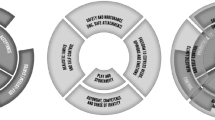Abstract
The schema mode approach (SMA) is a recent development in schema therapy that may offer a viable adjunct to CBT for PG, particularly for treatment-resistant PGs with characterological problems. SMA is a more flexible approach than Schema Therapy that examines the dysfunctional processes arising from key developmental gaps in the fulfilment of a patient’s basic needs. Schema modes are defined as a set of currently active schemas or schema operations that can be adaptive or maladaptive. Further exploration of SMA treatment for PG is encouraged due to the intuitive case conceptualisation process, the effectiveness of emotion focused, imagery and chair work techniques in isolating and treating problematic behaviour common to PG and the incorporation of the therapeutic alliance as an interventional tool is helpful in supporting vulnerable PG clients. A discussion of SMA and its relevance for PG together with a treatment case study is provided below.
Access this chapter
Tax calculation will be finalised at checkout
Purchases are for personal use only
Similar content being viewed by others
References
Arntz, A., & Jacob., G. (2013). Schema therapy in practice: An introductory guide to the schema mode approach. Wiley-Blackwell: Chichester, West Sussex.
Arntz, A., Tiesema, M., & Kindt, M. (2007). Treatment of PTSD: A comparison of imaginal exposure with and without imagery rescripting. Journal of Behaviour Therapy and Experimental Psychiatry, 38, 345–370.
Blaszczynski, A., & Nower, L. (2002). A pathways model for problem and pathological gambling. Addiction, 97(5), 487–499.
Brockman, R. N., & Calvert, F. L. (2016). Imagery rescripting for PTSD and personality disorders: Theory and application. Journal of Contemporary Psychotherapy, 47(1), 23–30. doi:10.1007/s10879-016-9329-4.
Ferris, J., & Wynne, H. (2001). The Canadian problem gambling index. Ottawa: Canadian Centre on Substance Abuse.
Foa, E. B., Steketee, G., & Rothbaum, B. O. (1989). Behavioral/cognitive conceptualizations of post-traumatic stress disorder. Behavior Therapy, 20, 155–176.
Hackman, A., Bennett-Levy, J., & Holmes, E. A. (2011). The oxford guide to imagery in cognitive therapy. Oxford: Oxford University Press.
Holmes, E. A., & Mathews, A. (2005). Mental imagery and emotion: A special relationship? Emotion, 5, 489–497.
Holmes, E. A., Arntz, A., & Smucker, M. R. (2007). Imagery rescripting in cognitive behaviour therapy: Images, treatment techniques and outcomes. Journal of Behavior Therapy and Experimental Psychiatry, 38, 297–305.
Hunt, M., & Fenton, M. (2007). Imagery rescripting versus in vivo exposure in the treatment of snake fear. Journal of Behavior Therapy and Experimental Psychiatry, 38, 329–344.
Johnson, J. G., Cohen, P., Chen, H., Kasen, S., & Brooks, J. S. (2006). Parenting behaviors associated with the risk for offspring personality disorder during adulthood. Archives of General Psychiatry, 63, 579–587.
Lobbestael, J., Arntz, A., & Bernstein, D. P. (2009). Disentangling the relationship between different types of childhood maltreatment and personality disorders. Journal of Personality Disorders, 24(3), 285–295.
Lobbestael, J., van Vreeswijk, M., Spinhoven, P., Schouten, E., & Arntz, A. (2010). Reliability and validity of the short schema mode Inventory (SMI). Behavioural and Cognitive Psychotherapy, 38, 437–458.
Lovibond, S. H., & Lovibond, P. F. (1995). Manual for the depression anxiety stress scales. Sydney: Psychology Foundation.
Petry. (2005). Pathological gambling: Etiology, comorbidity, and treatment. USA: American Psychological Association.
Problem Gambling Reseach & Treatment Centre. (2011). Guideline for Screening, Assessment and Treatment of Problem Gambling. Clayton: Monash University. Productivity Commission (2010). Gambling. Productivity Commission Inquiry Report. Volume 1. Report no. 50. Canberra: Productivity Commission.
Rickwood, D., Blaszczynski, A. Delfabbro, P., Dowling, N., Heading, K. (2010). The Psychology of Gambling APS Review Paper: Australian Psychological Society.
Renner, F., Arntz, A., Peeters, F. P. M. L., Lobbestael, J., & Huibers, M. J. H. (2016). Schema therapy for chronic depression: Results of a multiple single case series. Journal of Behavior Therapy and Experimental Psychiatry, 51, 66–73. doi:10.1016/j.jbtep.2015.12.001.
Scott, S., & Crino, R. D. (2014). Early maladaptive schema and social and occupational functioning: The mediating role of psychiatric symptomatology. Australian Journal of Psychology, 66(4), 224–232. doi:10.1111/ajpy.12061.
Young, J. E. (1990). Cognitive therapy for personality disorders: A schema-focused approach. Sarasota, Fl: Professional Resource Press.
Young, J. E. (1999). Cognitive therapy for personality disorders: A schema-focused approach (revised edition). Sarasota, Fl: Professional Resource Press.
Young, J. E. (2005). The young schema questionnaire: Short form. Available in electronic form at http://home.sprynet.com/sprynet/schema/ysqs1.htm.
Young, J. E., & Brown, G. (1990). Young schema questionnaire. New York: Cognitive Therapy Centre of New York.
Young, J. E., & Brown, G. (2001). Young schema questionnaire (Special ed.). New York: Schema Therapy Institute.
Young, J. E., & Klosko, J. S. (1994). Reinventing your life. New York: Plume Books.
Young, J. E., Klosko, J. S., & Weishaar, M. E. (2003). Schema therapy: A Practitioner’s guide. New York: Guilford.
Author information
Authors and Affiliations
Corresponding author
Rights and permissions
Copyright information
© 2017 The Author(s)
About this chapter
Cite this chapter
McIntosh, C. (2017). Schema Therapy for Problem Gamblers. In: Evidence-Based Treatments for Problem Gambling. SpringerBriefs in Psychology. Springer, Cham. https://doi.org/10.1007/978-3-319-62485-3_6
Download citation
DOI: https://doi.org/10.1007/978-3-319-62485-3_6
Published:
Publisher Name: Springer, Cham
Print ISBN: 978-3-319-62484-6
Online ISBN: 978-3-319-62485-3
eBook Packages: Behavioral Science and PsychologyBehavioral Science and Psychology (R0)



